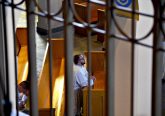Sunday Scripture: All ate and were satisfied
Wednesday, June 2, 2010
By Sister Betty J. Lillie, S.C.
The Most Holy Body and Blood of Christ: Genesis: 14:18-20; Psalm 110:1-4; 1 Corinthians11:23-26; Luke 9:11b-17
Having completed the Easter season and returned to Ordinary Time, our liturgical cycle offers us the celebration of several beautiful feasts that remind us of God’s abundant spiritual blessings to the church. That brings us to this Sunday’s feast of the Most Holy Body and Blood of Christ.
Some of us may remember the feast by its Latin title, Corpus Christi. Christ gives us His own body and blood under the forms of bread and wine, by which our spiritual hunger is nourished as we continue on our journey to the heavenly banquet in the kingdom of the Lord.
In our first reading for this Sunday we have a reference to the blessing of Abraham by God Most High, reminiscent of God’s call and blessing of Abraham in Genesis 12:2. In our passage God Most High is identified with the God of Israel, who is the maker of heaven and earth.
Melchizedek brought out an offering of bread and wine as a blessing on Abraham. That prefigurement was fulfilled by Jesus who gave His own body and blood under the same forms. Later in Scripture the unknown Mechizedek would be interpreted messianically by the psalmist (Psalm 110:4) and the writer of the Letter to the Hebrews (Hebrews 7:1-17).
In our second reading we have a traditional liturgical text presented by St. Paul in his First Letter to the Corinthians (1 Corinthians 11:23-26). Though basic elements of eucharistic texts are found in Mark, Matthew and Luke, it is in Paul’s text that we find several terms and themes from the Hebrew Scriptures that lend a richness to New Testament eucharistic theology.
The terms are body, remembrance, cup and blood. Body calls up the notion of Christ’s body given for us, as well as that of a people who are one people/body though they are many members. Remembrance finds expression in associating the bread and wine of the Passover celebration with the bread and wine of the Lord’s Supper, which became Jesus’ body and blood. Cup holds the blood of sacrifice in which the members participate. Blood in the Exodus narrative had a propitiatory significance that carries over to Jesus’ redemptive act of shedding His own blood for the salvation of the world.
The themes are sacrifice and covenant. Sacrifice in the New Testament is the Eucharist in which the body of Christ is given up for us. Covenant signifies the new covenant in the blood of Christ that reminds us that the Eucharist is meant to influence our whole lives to their very depths.
These considerations are followed in our Gospel reading with Luke’s version of the feeding story. There, Jesus looked up to heaven and blessed the loaves and fishes. That action recalls Jewish devotional meals and reminds us of the Last Supper that Jesus transformed into an expression of His disciples’ association with Him in His death and victory. In the feeding story all ate and were satisfied; in the Lord’s Supper Jesus’ abundant providence was for all time.
With the psalmist we can praise the Lord for His victory. With His mighty scepter He will reign forever (Psalm 110).
Sister Betty Jane is a faculty member at the Athenaeum of Ohio.










